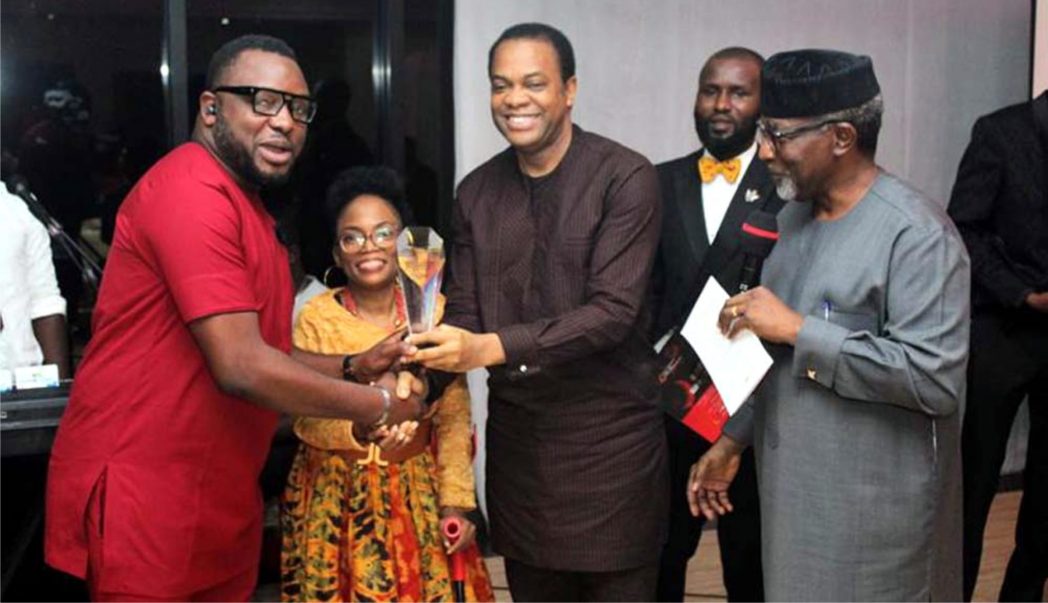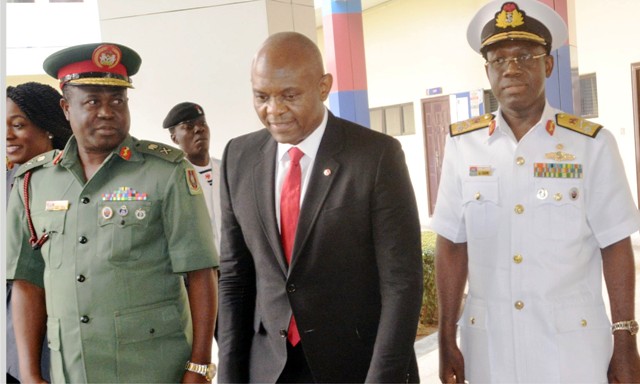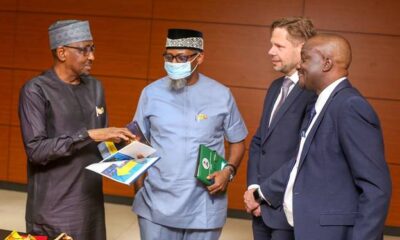Business
Nigeria’s GDP To Grow By 1.9% – IMF

The International Monetary Fund (IMF), says Nigeria is expected to grow by 1.9 per cent in 2018, up from 0.8 per cent in 2017, mostly owing to fewer disruptions in oil production.
The IMF Senior Resident Representative for Nigeria, Mr Amine Mati said this while presenting the “Fall 2018 Regional Economic Outlook for Sub-Saharan Africa’’ on Thursday in Abuja.
Mati said that some pick-up in the non-oil economy was also responsible for the predicted growth.
“The recovery is expected to contribute about 0.7 percentage points to the region’s average growth in 2018 and lift activity in Nigeria’s trading partners through stronger remittances, financial spillovers and import demand.’’
He also said that average growth for the region was expected to reach about 3.1 per cent in 2018, up from 2.7 per cent in 2017.
According to him, recovery in sub-Saharan Africa is expected to continue amidst rising risks as growth momentum improved most notably for oil exporters, mainly in Nigeria, but remains subdued in South Africa.
He also said that as the magnitude of capital flows to the region increased, the volatility also increased.
He, however, said that further escalation of trade tensions could threaten the recovery, adding that if the tensions persist, it would have potential impact on Gross Domestic Product (GDP).
Mati also said that public debt was diverting more resources toward interests payments, adding that for Nigeria, though debt to GDP was quite low, more than 50 per cent of revenue went into interest payments.
He said that increase in revenue was very important to bridge the gap to ensure that revenue to GDP was sufficient to pay up and service the debt profitably.
The IMF representative also said that meeting the Sustainable Development Goals (SDGs would require stronger growth and more financing.
He said that policies that would enhance creation of about 20 million new jobs yearly in the region to meet the demand was needed as meeting the SDGs by 2030 was dependent on that.
Mati, however, said that job creation was complicated by uncertainty on the extent to which technology replaces labour.
The Deputy Governor, Economic Policy, Central Bank of Nigeria (CBN), Mr Nnanna Okwu said capital inflows into Nigeria responds to both domestic and external shocks.
Represented by Mr Friday Ogwuche, also of the CBN, Okwu said Foreign Direct Investments (FDIs), inflows were becoming more diversified in response to the changing structure of the Nigerian economy.
He said that there were certain factors shaping capital inflow behaviour in recent times, adding that high oil prices and growth in external reserves provides confidence for capital inflows into the country.
Okwu also said that tepid recovery from recession and relatively stable macroeconomic environment provided impetus for capital inflows back to Nigeria between 2017 and 2018.
“Also, uncertain political environment as a result of the 2019 general elections is a source of concern for foreign investors and may have influenced capital reversal in recent months.’’
He, however, said that as at 2017, data indicated that Akwa Ibom, Lagos, Abuja and Ogun states drew the highest capital inflows because of gradual improvement in infrastructure in those places.
The Director-General, Debt Management Office (DMO), Ms Patience Oniha said issues in the international markets also affect Nigeria’s borrowing.
Oniha noted that the U.S dollar interest rates were rising and foreign investors in Nigeria were exiting and selling out because of the rise in these interest rates.
Business
Insecurity, Poor Power Supply Hamper Business Activities – Survey

Business in Nigeria remain under pressure as a result of insecurity and erratic power supply which continue to stifle productivity in the country.
This is even as new data from the Central Bank of Nigeria (CBN) indicate sustained improvements in economic activity.
This was the response of businesses in the CBN’s October 2025 Business Expectations Survey (BES) and the Purchasing Managers’ Index (PMI) report.
While the PMI showed that economic activity expanded for the 11th consecutive month, the BES revealed that businesses are still grappling with crippling operational constraints that threaten to reverse recent macroeconomic gains.
According to the BES conducted between October 6 and 10, firms identified insecurity (71.8 points) as the most critical challenge affecting operations nationwide. This was closely followed by insufficient power supply (70.9 points), multiple taxation (70.2 points), high interest rates (68.4 points) and financial constraints (65.6 points). Analysts say these constraints underscore the depth of structural weaknesses confronting Nigeria’s private sector.
Despite these challenges, the survey reported a rise in business optimism. The Business Confidence Index increased to 38.5 points in October from 31.5 in September. Firms also projected confidence levels to reach 45.6 points in November, with expectations of further improvement over the next three to six months.
However, sector analysts warn that the optimism remains fragile due to the lack of significant improvements in the operating environment.
The BES further showed a modest rise in capacity utilisation from 60.4% in September to 62.0% in October, suggesting that businesses have yet to deploy their productive capacity amid ongoing disruptions fully.
In contrast to the structural constraints highlighted in the BES, the PMI report indicated strengthening economic momentum. The composite PMI rose to 55.4 points, reflecting expansion across major components such as output, new orders, employment, inventories, and supplier delivery times.
A sectoral breakdown showed that the agriculture sector recorded the most substantial improvement, with its PMI climbing to 57.5 points, marking 15 consecutive months of expansion. The services sector also expanded for the ninth straight month to 55.6 points, while the industry sector rose to 54.2 points, the highest in more than a year.
The CBN attributed the positive trends to improvements in the broader macroeconomic landscape, including declining inflation, which eased from 24.5% in January to 18.0% in September, and the year-to-date appreciation of the naira across both official and parallel markets.
The BES showed that the North-East posted the highest business confidence at 56.1 points, while the South-South recorded the lowest at 23.3 points, a trend linked to declining activity in oil-producing communities.
Business
FG Set To Launch Free National Financial Literacy Training For 100,000 Youths,
The Federal Government will on Tuesday, November 25, officially unveil a strategic programme for a free nationwide training of over 100,000 youth on financial literacy.
The Federal Ministry of Youth Development will launch the programme in collaboration with Investonaire Academy. Tagged, the “Financial Literacy, Investment, and Wealth Creation programme.”
The flagship initiative is designed to equip young Nigerians with essential financial skills, investment knowledge, and digital competencies for sustainable wealth creation.
A statement signed by the Director, Press and Public Relations, Federal Ministry of Youth Development, Omolara Esan, and made available to newsmen, confirmed that the launch of the programme, to be held in Abuja, would promote nationwide participation.
It added that the launch would bring together senior government officials, development partners, private sector leaders, and youth representatives to explore innovative approaches for improving financial capability and strengthening the economic prospects of young Nigerians.
Minister of Youth Development, Comrade Ayodele Olawande, would serve as the chief host, while the Minister of Women Affairs, Hajiya Imaan Sulaiman-Ibrahim, would grace the event as the Special Guest of Honour.
Also expected are representatives of key government institutions and private sector partners, including Dr Enefola Odiba, International Programme Director, Investonaire Academy, and Mr. Bashir Nurmohamed, Chief Executive Officer, Hantec Markets
The statement reads, “A major highlight of the event will be the unveiling of a free national financial literacy training programme targeting over 100,000 youths annually. The programme will be powered by a state-of-the-art Learning Management System (LMS) designed to enhance financial intelligence, investment capacity, and entrepreneurial readiness among Nigerian youth.
Lady Godknows Ogbulu
Business
‘Entrepreneurs, Not Foreign Aid Drive Nigeria’s Growth’

The chairman of the United Bank for Africa, Tony Elumelu, says Nigeria’s economic transformation will be driven by entrepreneurs, not government handouts or foreign assistance.
Elumelu, who spoke at the Grow Nigeria Conference 2.0 and themed ‘Empowering Nigeria’s Entrepreneurs: Building Institutions That Last’, in Lagos, Monday, said the nation’s future is already being shaped by business owners who refuse to settle for mediocrity.
Elumelu, who is also the founder of the Tony Elumelu Foundation, described Nigeria as an entrepreneurial nation but stressed the need to build institutions that can stand the test of time.
“Starting businesses is good. Sustaining them is critical, and that’s how we transform this economy,” he said.
He noted that many promising ideas fail because the systems and support structures necessary for growth are absent.
According to him, Nigeria’s renewal must come from the private sector, backed by strong governance frameworks and proper succession planning.
“Nigeria will not be built by government handouts or foreign aid. Government’s role is critical, but Nigeria will be built by entrepreneurs — by you, building businesses that create jobs, hope, and prosperity from the ground up,” he said.
Elumelu, however, emphasized that entrepreneurs cannot succeed in isolation.
“You need frameworks — clear governance, succession planning, and relentless focus on value. We need the right environment. We need a Nigeria where policies are predictable, infrastructure works, and financing is truly accessible,” he said.
He called for stronger alignment between public and private sector efforts, warning that progress would remain limited if institutions work independently rather than collaboratively.
Elumelu commended the Director-General of the Small and Medium Enterprises Development Agency of Nigeria (SMEDAN), Charles Odii, for ongoing reforms within the agency.
He further lauded President Bola Tinubu for appointing young Nigerians to lead key institutions and for prioritizing youth entrepreneurship.
“Let us cut the bureaucracy. Make finance and opportunity real, not theoretical. Let’s help Nigeria’s entrepreneurs move from surviving to winning.
“Every job we create fights insecurity. Every thriving business increases our tax base and accelerates prosperity for all,” Elumelu added.
-
News5 days ago
Reps Move To Suspend 2026 WAEC’s Computer-based Exam Policy
-
Sports5 days ago
New WW Whyte Secondary Schools Cup Kicks Off In PH
-
Sports5 days ago
Golfers Donate N6m To Charity Homes After Tournament
-
Opinion5 days ago
The Girl Who Didn’t Dance
-
Business5 days ago
PenCom Completes Nov Retirees Payments, Declares End To Delayed Pension Disbursements
-
News4 days ago
NELFUND Warns Students Against Fake Loan Portal
-

 News5 days ago
News5 days agoFG Suspends Planned 15% Import Duty On PMS, Diesel
-
Sports5 days ago
Bisi Open Championship: Coach Attributes Victory To Hard Work

